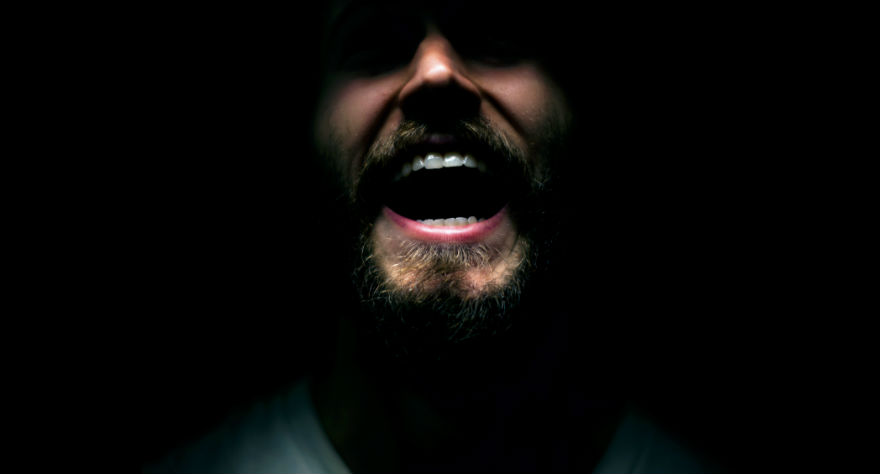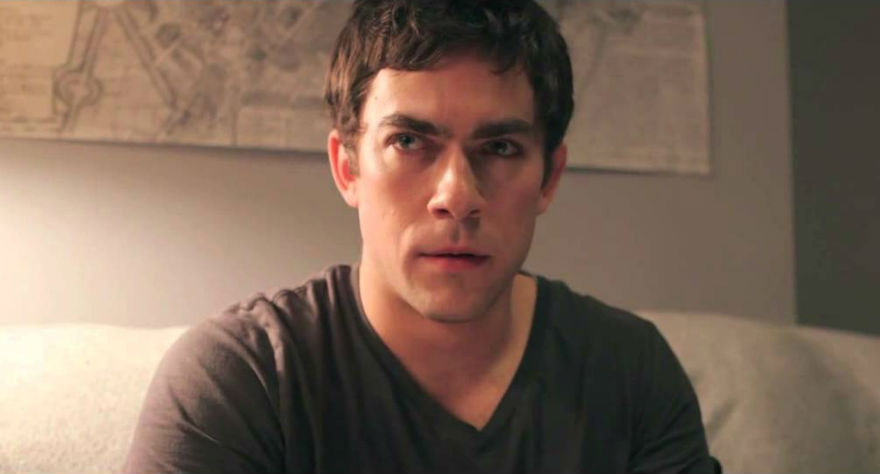Friendship Comes First In Genre Gem ‘They Look Like People’

A tale of love and nightmares, They Look Like People is a haunting, fun, emotionally rich genre piece that gives you plenty to ponder after the closing credits. Filmmaker Perry Blackshear and actors Evan Dumouchel and MacLeod Andrews ran a tiny, DIY production with a crew that consisted mostly of themselves, but they’d have had it no other way. Their goal was simply to make something together, bounce ideas off of each other and strengthen the bond and friendship they already had. In this regard, the project was a complete success. The fact that the movie kicks copious ass is just icing on the cake.
The movie follows Wyatt (Andrews), a disturbed man who foresees an impending war with otherworldly shape-shifters. Teetering on the edge of madness, he stays with his friend Christian (Dumouchel), who’s trying his best to understand Wyatt’s paranoia but struggles to come to terms with his bizarre visions. Confused and pushed to the breaking point, their friendship is put to the test, all leading to a heartstopping moment of truth that will change their lives forever.
I spoke with Perry, Evan and MacLeod during their visit to San Francisco this past February to talk about They Look Like People, which will be available to watch on demand in the coming months. To keep track of the movie, visit theylooklikepeople.com and like their facebook page.

I liked how the film explored mental health. I remember when I was battling depression I’d sometimes think terrible thoughts about my loved ones. It was really weird.
Perry: My friend went through a really tough time and started to think people were spying on him and also that people he loved were evil things pretending to be his loved ones. This friend is now extremely successful and married and is about to have his first kid. There isn’t anything deeply wrong with him, but I think that kind of thing can happen to anybody. It’s scary, man.
Evan: We’ve had a lot of people talking about how they can identify with what’s going on in the film. Maybe not just those kind of thoughts, but any issue you have with a friend. It resonates with people by simply asking them how they would react to a similar experience.
MacLeod: There has been a handful of people who very specifically have had similar circumstances with their friend.
Perry: We guys are really emotionally inept. [laughs] Sometimes when your friend is going through something, you’re just like, “Cool, man. Well…cool.” [laughs]
Evan: “Whoa, that sucks, bro.”
Perry: You can’t just say, “Call me if you have a problem.” There have been times when I’ve missed those kinds of signs. You have to kind of stay with someone. The movie’s about paying close attention to stuff like that.
What’s nice is that your movie is a love story between to guy friends who are very vulnerable. I feel like the media doesn’t really depict men as being vulnerable or needing help enough.
Evan: I would argue Whiplash is a love story between two men! [laughs]
You know what? I interviewed Damien Chazelle and I said that to him. I said that I felt it was a sexual movie, not in the literal sense of Miles Teller and J.K. Simmons being romantic, but in the tone of their relationship. He looked at me like, “I have no idea what you’re talking about.”
Evan: I definitely feel like it’s a love story, or at least a way that men can be men with each other that’s not about anything that’s sexually charged. There are a lot of different kinds of love. I think it’s important to explore that.
Perry: I wanted the movie to be about love between humans. People have said “bromance,” but I think it’s that these friends just happen to be guys.
MacLeod: But I think it is specifically about Christian’s experience and how he perceives masculinity; how he approaches women, how he wishes he could.
Talk about the scene where you’re doing judo with Margaret.
Evan: The take you see in the film is the first one. We didn’t know if we had the camera set up or the sound right. She had told us that she was a brown belt in judo, but that’s like someone saying they’re a concert pianist and you’ve never heard them play the piano. We were like, “Cool. She’s probably taken a few judo classes.” She proceeded to dismantle me. Everything you see, like when she asks me if I’m ready, I’m just being real to the experience prior to getting my butt kicked. [laughs] I got the wind actually knocked out of me. That’s all take one.
Perry: Right before she put the rear naked choke on him, she said, “I just did this at a wedding, and the guy passed out.”
How about tapping on her ass? Was that planned?
MacLeod: That’s just what happened. He was trying to tap out.
Evan: Mostly I was fighting for breath.
I was watching the movie in my apartment, and when she did the judo throw I was like, “OOOOHHHHH!!!” My wife asked if I was watching UFC, which I do a lot, but I told her, “No—this dude just got judo thrown on his ass on the fucking grass!”
Perry: Who’s the woman who broke, like, 100 girls’ arms?
Ronda Rousey.
Perry: Margaret used to do judo with her. But yeah, that was the first take, and we didn’t know what was going to happen, so you can actually hear in the footage all of us go, “OH MY GOD!!!”
Evan: Then we did four more takes, and we used the first one anyway. [laughs]
Just sitting with you I can tell you guys make a good team.
Perry: The whole reason I made the movie was to work with these guys. We bought the plane tickets for the movie before I wrote the script, which was a big leap of faith on their part. I told Margaret I was making a movie and it had no script, and she said yes. It was a really tiny crew and very collaborative. It was extremely hard. A lot of times the difficulty on set is navigating the different personalities and millions of logistics, but this movie felt like the four of us together, hiking up a giant mountain. There were no overlords.
MacLeod: I think we’re all sensitive to trying to take responsibility and work harder. If one of us would be tiring out, the others would be like, “I can handle this right now.” We’d kind of clap each other up.
Evan: We could all sense when we needed to be there for each other.
MacLeod: Perry’s been on tons of film sets and has seen everything that can go wrong on them. To us, an important thing was to come out of making this movie and still be friends. Perry presented to us this little constitution of ten laws that ended up being so important. One of them was to try and get eight hours of sleep a night. No drinking. If two of the three people take the other one aside and say, “You’re getting a little grumpy. You need to go have a snickers,” you have to stop and go eat something, no matter what. You start getting angry and short with people, and a lot of times it’s because you’re hungry. All three of us would do that at some point.
Evan: Another really important one was 20-minute naps after meals.
MacLeod: Snack time and nap time.
Perry: It’s basically preschool.
MacLeod: Preschool is kinda genius! It’s the basics of what people need!
That’s going to be the headline of the article, by the way: “Preschool is Kinda Genius.”
Perry: We didn’t have much money, but the equity we had was each other. It was very important to protect that and to make sure we were functioning.
MacLeod: The three of us working together was the point. The movie turned out great, but it was secondary to the process of working together. Protecting the friendship and the process was more important that manipulating each other.
Perry: I have a lot of director friends. On bigger sets, there are a lot of tough decisions to be made about relationships and success. I don’t know what’s going to happen in the future, but our number one priority is to make sure we stick together.
Moving forward, how do you protect that bond? It’s going to get harder.
Perry: One of the biggest things I learned is that there’s more than one way to make a movie. Our way isn’t necessarily the right way, but it worked for us. The Duplass brothers make Hollywood movies, but they have a union crew. Once they set up the set, they get them out on the lawn for a day, and it’s just them and the cinematographer and the actors in a room. They protect the things that matter. We learned the things that are really important to us: the story, the characters, and the relationships. If other stuff started to infringe on those, we’d bring it back to what mattered. Hopefully, we can keep doing that even if things start getting bigger. My favorite thing about moviemaking is making them together, with your crew.
There’s a climactic moment of suspense at the end of the movie involving a paper bag. Regarding what’s underneath the bag: it could have gone one of two ways. I love the way you chose to go. I feel like most movies would go the other way. Was that always the ending, or was there a serious decision to be made about which way you went?
Perry: There was a decision to be made. The ending changed throughout writing the script a lot. Even though it’s a movie about monsters and scary stuff, it ended up being way more personal than we expected. The ending emerged from that.
Evan: I think it speaks to Perry’s use of structure and creating a truth to the answer to both questions. I’m really happy about it. The question exists in people’s minds of whether one or the other could be the case. Each could have been true for somebody, and that’s cool for me to hear.
Perry: We wanted to end in a way that gave some answers to some questions, but left others unanswered.
